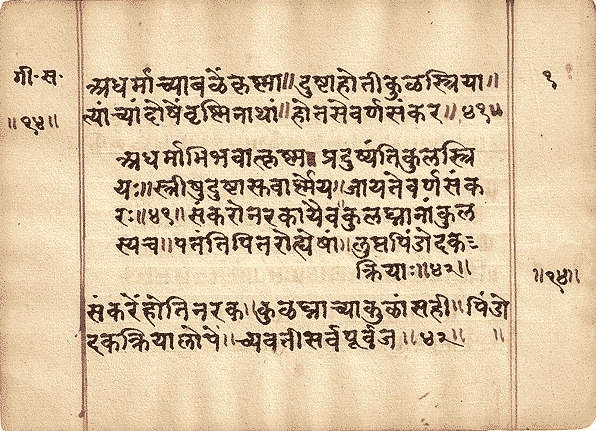
adharmābhibhavāt kṛṣṇa praduṣyanti kula-striyaḥ
strīṣu duṣṭāsu vārṣṇeya jāyate varṇa-saṃkaraḥ
Update RequiredTo play the media you will need to either update your browser to a recent version or update your Flash plugin.
he kṛṣṇa (O Kṛṣṇa!),
he vārṣṇeya (O descendant of Vṛṣṇis!),
adharmābhibhavāt (from the predominance of lawlessness) kula-striyaḥ (family women) praduṣyanti (they get polluted).
strīṣu duṣṭāsu (when the women are polluted) varṇa-saṁkaraḥ (confusion of social classes) jāyate (it is born).
| adharmābhibhavāt |
– |
a-dharma-abhi-bhava 5n.1 m.; TP: adharmasyābhibhavāt iti – from the predominance of lawlessness (from: a-dharma – lawlessness; abhi-√bhū – to overcome, to predominate, abhibhava – overpowering, predominance, defeat); |
| kṛṣṇa |
– |
kṛṣṇa 8n.1 m. – O dark one, O Kṛṣṇa; |
| praduṣyanti |
– |
pra-√duṣ (to become corrupted) Praes. P 1v.3 – they are polluted; |
| kula-striyaḥ |
– |
kula-strī 1n.3 f.; TP: kulasya striya iti – family women (from: kula – tribe, family; √sū – to beget, to produce, strī – woman); |
| strīṣu |
– |
strī 7n.3 f. loc.abs. – when the women (from: √sū – to beget, to produce); |
| duṣṭāsu |
– |
duṣṭa (√duṣ – to become corrupted) PP 7n.3 f. – when they are polluted (loc.abs.); |
| vārṣṇeya |
– |
vārṣṇeya 8n.1 m. – O descendant of Vṛṣṇis; |
| jāyate |
– |
√jan (to be born, to produce) Praes. Ā 1v.1 – it is born; |
| varṇa-saṁkaraḥ |
– |
varṇa-saṁkara 1n.1 m.; TP: varṇānāṁ saṁkara iti – confusion of social classes (from: √varṇ – to paint, to delineate, to tell, varṇa – colour, social class; sam-√kṝ – to mix, saṁkara – confusion); |
no commentary up to the verse BhG 2.10
no commentary up to the verse BhG 1.47
no commentary up to the verse BhG 2.11
tataś ca adharmābhibhavād ity ādi ||40||
praduṣyantīti | adharma eva tā vyabhicāre pravartayatīti bhāvaḥ
tataś cādharmābhibhavād iti | asmad-bhartṛbhir dharmam ullaṅghya yathā̆akula-kṣaya-lakṣaṇe pāpe vartitaṃ, tathāsmābhiḥ pātivratyam avajñāya durācāre vartitavyam iti durbuddhi-hatāḥ kula-striyaḥ praduṣyeyur ity arthaḥ

